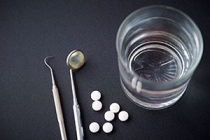
Addressing the vital role of dentists in helping to alleviate the opioid crisis is the subject of a commentary, publishing today in the Journal of the American Dental Association. The commentary, authored by Dr. Nora Volkow, director of the National Institute on Drug Abuse, and Dr. Martha Somerman, director of the National Institute of Dental and Craniofacial Research, both parts of the National Institutes of Health, highlights how the Institutes are working together to support scientific research for those in clinical practice.
In the late 1990s, dentists were the top specialty prescribers of opioids. Due to a number of initiatives, prescriptions by dentists dropped more than 50 percent by 2012. However, the authors argue that more needs to be done to continue to reduce opioid misuse and abuse. The commentary discusses several ways scientific evidence can help guide clinical care decisions, including:
- Continue research into dentists’ prescribing practices and emergency department use of opioids for dental pain to inform practices and minimize the risk of opioid misuse;
- Develop tools to improve clinical decision-making related to the appropriate use of non-opioid pain medications;
- Develop targeted research interventions to address the use of opioids in rural communities; and
- Coordinate dissemination of the latest research findings and clinical guidelines and recommendations.
Partnerships with the American Dental Association pave the way for increased collaboration between clinicians and researchers, which supports the NIH HEAL (Helping to End Addiction Long-term) Initiative, a trans-agency effort to speed scientific solutions to stem the national opioid public health crisis, as well as the NIDAMED initiative, which disseminates science-based resources to health professionals on the causes and consequences of drug use and addiction, and advances in pain management.
For a copy of the commentary, go to: The Role of the Oral Health Community in Addressing the Opioid Overdose Epidemic.
Read NIDA Director Dr. Nora Volkow’s blog: NIH Partners with the Dental Community to Help Curb the Opioid Crisis.
For more information about opioids, go to the National Institute on Drug Abuse (NIDA) and the National Institute of Dental and Craniofacial Research’s (NIDCR) web pages on opioids: Opioids (NIDA) and Opioids (NIDCR). For more information from NIDCR, please contact nidcrinfo@mail.nih.gov or 301-496-4261.
For more information about NIDAMED, including information on dentistry and opioid use, go to: NIDAMED: Medical & Health Professionals.
For more information on the HEAL Initiative, go to: NIH HEAL Initiative.
For more information, contact the NIDA press office at media@nida.nih.gov or 301-443-6245. Follow NIDA on Twitter and Facebook.
NIDA Press Office
301-443-6245
media@nida.nih.gov
About the National Institute on Drug Abuse (NIDA): NIDA is a component of the National Institutes of Health, U.S. Department of Health and Human Services. NIDA supports most of the world’s research on the health aspects of drug use and addiction. The Institute carries out a large variety of programs to inform policy, improve practice, and advance addiction science. For more information about NIDA and its programs, visit www.nida.nih.gov.
About the National Institutes of Health (NIH): NIH, the nation’s medical research agency, includes 27 Institutes and Centers and is a component of the U.S. Department of Health and Human Services. NIH is the primary federal agency conducting and supporting basic, clinical, and translational medical research, and is investigating the causes, treatments, and cures for both common and rare diseases. For more information about NIH and its programs, visit www.nih.gov.
NIH…Turning Discovery Into Health®
